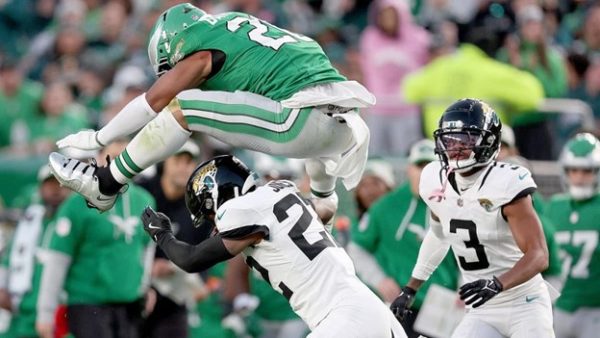The Realities of Fantasy Football
Every year when September rolls around, it seems you hear more and more about Fantasy Football. Fantasy Football is an online “league” where six to 12 people can draft current NFL players to their “team.”
After the draft is over and the NFL season starts, the fantasy owners of each team will set their lineups, which means that out of all the players they picked, they will each choose one quarterback, two running backs, two receivers, one flex position (wide receiver, running back, or tight end), one kicker, and one defense.
Once the lineup is set, the players of each team will go against each other, and the team with the most points after the NFL week wins.
The point scoring is pretty simple; a player gets one point for every 10 yards and six points for each touchdown. The points are different for a quarterback, since the quarterback usually gets more yards and more touchdowns than everyone else on the team. For a quarterback, every 20 yards is a point, and every touchdown counts for four points.
While it seems straight forward, Fantasy Football is a very complex and popular “game.” There are websites devoted to Fantasy Football, ranging from week-to-week advice to suggestions for players to drop or pick up for your team. Fantasy players all over the country visit these websites.
For example, NFL.com, the official website of the National Football League, publishes an article each Wednesday called “Start ‘em, Sit ‘em.” The writer of this article researches the current games that week in the NFL and persuades readers to either put a certain player in their fantasy lineups, or take him out because the competition he is playing is tough.
In week five of the Fantasy “Start ‘em, Sit ‘em,” Michael Fabiano, one of NFL.com’s leading writers, stated that the “start of the week” is the San Diego Chargers quarterback Phillip Rivers, against the Oakland Raiders defense. He stated that Rivers has been one of the “hottest field generals” in the league this year.
Fantasy Football, an up-and-coming game that is expanding the league’s revenue, cannot only be played by dedicated fans, but can also be played by people who just want to have fun on Sundays. Dikembe Wilkins, a CB South senior and a participant in a Fantasy Football league, said that he likes Fantasy Football because it “gives [him] a chance to win at something else.”
Even though many people research before drafting their players, Wilkins has a different strategy. He says that he “goes with what feels right,” and on Sundays, he checks his team constantly to see how they are doing.
Like Wilkins, senior Dan Young plays Fantasy Football for a “fun experience” that allows a player to have the “best football players in the league on your team leading your team to victory against your friends.”
In a regular week, Dan said he spends about five to 10 minutes a day, three days a week, setting up his lineup for the upcoming Sunday.
Compared to another CB South senior, Dan Remick, 15 minutes a week is a small amount. Remick spends at least five minutes every day checking injury updates and setting his lineup.
While people can most surely play just for fun, Fantasy Football has become a competitive and sometimes lucrative “side job.” Some of the most competitive leagues have an entry fee as high as $100, and that money gets added to the pot. Once the season is over, the money is distributed to the winner, and sometimes, some of the money is given to second place.
Even though Fantasy Football seems like a fun and relaxing game to play with your friends, it is known to be very frustrating. There are articles written by popular sports websites such as Bleacher Report, Washington Times, and Sports Illustrated, explaining why Fantasy Football is so frustrating to people who play it.
For example, this season, Adrian Peterson, who is arguably the best running back in the league and a number one overall pick in many leagues, has been accused of child abuse and violating parole rules. He has been suspended from the league and will probably not return this season, which has a serious impact on any fantasy teams to which he was drafted.
Yes, Fantasy Football is frustrating; yes, Fantasy Football is fun, and this combination of love and hate by the people who play it is why it is so near and dear to their hearts. Whether or not you are a football fan, this will not be the last time you hear of Fantasy Football.


